by Ana Ionova Fri 21 Feb 2020
Packed into the brightly lit samba rehearsal hall, in the Mangueira favela of Rio de Janeiro, hundreds of revellers dressed in pink and emerald threw their arms towards the sky and burst into song. As they sang, some wiped tears from their eyes. Couples drew closer, clutching one another’s hand.
“My name is Jesus of the people,” the crowd chanted. “I am found in love which finds no boundary; search for me in the ranks who fight against oppression.”
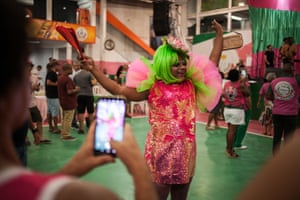
A reveller dressed in drag poses for a photo during a rehearsal show.
As Rio de Janeiro prepares to kick off its annual Carnival festivities on Friday, Mangueira is among several samba schools poised to turn the world’s biggest festival into a platform for protest against the divisive rhetoric that has marked President Jair Bolsonaro’s first year in office.
This year, the Mangueira parade will tell the story of Jesus born in the favela who stands up to “prophets of intolerance”.
The school’s theme comes against a backdrop of deep polarization in Brazil since the country elected an ultra-conservative president who has gained infamy with offensive remarks about women, black people, gays and indigenous people. Bolsonaro has also vowed to loosen gun controls, promising criminals will “die like cockroaches on the street” at the hands of police.
The headline song envisions Christ with a “black face, indigenous blood and the body of a woman” and – in what appears to be a rebuke to the president – warns that there is “no Messiah with a gun in hand”. (Bolsonaro’s middle name Messias means “messiah”.)
Among the school’s planned costumes, a bearded Mary Magdalene clad in a rainbow flag holds a placard asking, “Brother, will you hit with a stone?” while a mourning “Mary of Brazil’s Suffering” bears a black Brazilian flag reading, “Murderous State”.
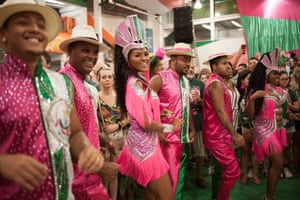
Samba dancers perform at the Mangueira samba school rehearsal.
Mangueira’s main message this year is one of fraternity, tolerance and love, explained Manuela Oiticica and Luiz Carlos Máximo, the couple who wrote the headline song titled, “The truth will set you free.”
“This is the Christ of Mangueira,” said Oiticica. “He died for those values, he was murdered because of those values. And these are the values that we need to recover today.”
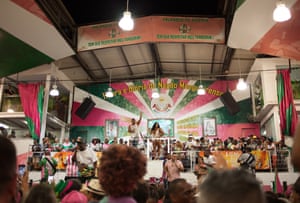
Revellers and members of the Mangueira samba school in Rio de Janeiro welcome the queen of the school during a rehearsal show.
Oiticica and Máximo insisted the lyrics are meant as a wider criticism of the intolerance and division gripping Brazil at the moment, rather than a pointed attack on the president. “There are so many saviours of the country who propose violence as a method of salvation,” Oiticica said.
Mangueira, is one of Rio de Janeiro’s most reknowned samba schools – and one of its most outspoken. Last year, it was crowned Carnival champion for its tribute to Brazil’s unsung black and indigenous heroes, including the Rio councilwoman and LGBTQ+ activist Marielle Franco, who was assassinated in 2018.
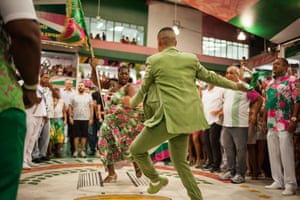
The Mangueira samba school flag-bearer and her escort perform during a rehearsal show.
Yet this year’s theme has angered some religious groups, who have accused the school of blasphemy. A petition by the Catholic organization Instituto Plinio Corrêa de Oliveira has so far drawn more than 110,000 signatures.
Other schools are also preparing performances with strong political themes: the São Clemente samba school is focusing on the spread of misinformation. Fake news shared on WhatsApp played a key role during the 2018 elections, with much of the misinformation favoring Bolsonaro.
“There’s an orange! In my hand, one is three and three is 10,” the lyrics say. “Brazil, you shared, it went viral – but you didn’t even see it! And the whole country … fell to fake news.”
In its synopsis, the school says trickery – or malandragem – is “institutionalized” in Brazil, and argues that politicians are the greatest swindlers come election time. “Every time, hope is renewed, until the first crooked curve: after being elected, the trickster leaves the people adrift. By voting, the greatest illusions are sold.”
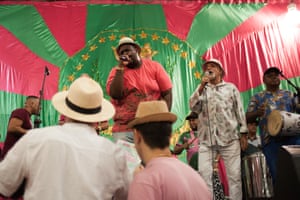
Musicians from the Mangueira samba school perform one of the songs composed for this year’s Carnival at a rehearsal on 25 January.
“We are living in a moment where there’s a lot of hurt, there’s a lack of information,” said Thiago Almeida, the school’s carnival director. “We want to carry a message that the public wants to hear, that reflects the reality that we are currently living.
The Mocidade Independente de Padre Miguel school, meanwhile, is mounting a critique on racism, inequality and the persecution of minority religions. At its base in Rio de Janeiro’s sprawling Samba City, a towering parade float is lined with open, lipsticked mouths. A black hand, holding an empty plate, reaches out of each one.
This year, the school is paying homage to the renowned Brazilian singer Elza Soares, who grew up in a favela in the Padre Miguel neighborhood and became a champion of women’s rights and Afro-Brazilian culture. (When the host of a singing competition asked a rail-thin young Soares what planet she came from, she memorably replied: “Planet Hunger.”)
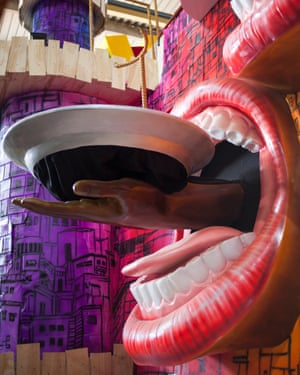
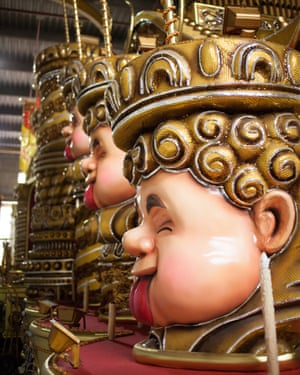
The school’s lyrics describe Soares as a black woman who “silenced oppression” with her voice, and they urge Brazil to “face the evil that consumes” it. The song also gives a nod to Afro-Brazilian religions Candomblé and Umbanda, whose temples and followers have increasingly come under attack by fundamentalists.
“She was a woman of humble origin, black – she had to fight a lot,” Jack Vasconcelos, the school’s carnavalesco, or creative director, said. “So it makes sense that we take someone like Elza and use her story as a tool to be able to speak out, to talk about the excluded, to talk about the social issues that affect us.”
For Mangueira’s Máximo, it is “fundamental” for samba schools as popular cultural institutions to represent the realities of their communities.
“Carnival is about joy … but samba schools are reflecting what society is experiencing, they are talking about what the Brazilian people are living and suffering,” he said. “And that’s the thing about samba – it sings about the saddest things, but with joy.”
No comments:
Post a Comment